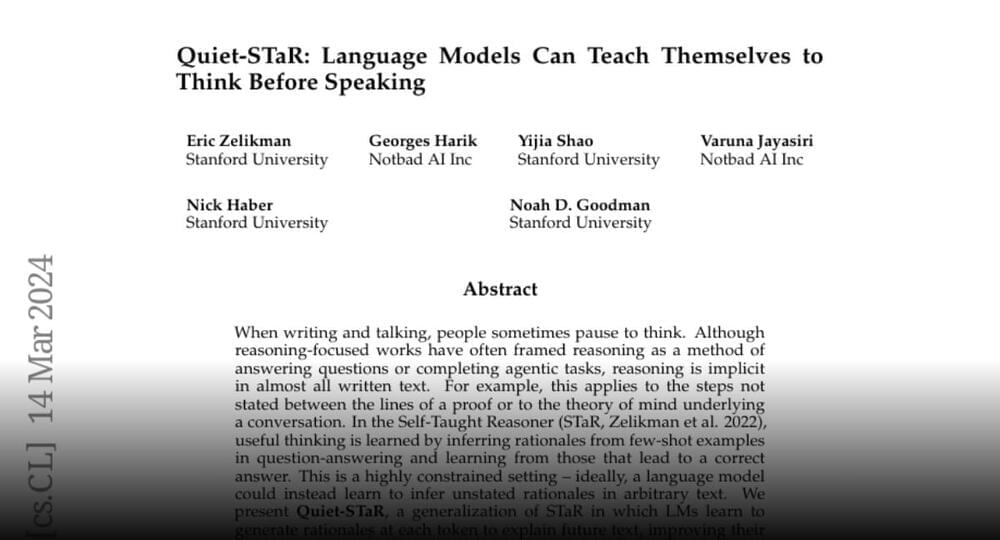LatestPaper “Exploring beyond Common Cell Death Pathways in Oral Cancer: A Systematic Review” is now available.
Special Issue in journal Biology: Cell Self-Destruction (Programmed Cell Death), Immunonutrition and Metabolism.



Third time’s the charm (of sorts) for SpaceX’s Starship, which soared over the Gulf of Mexico Thursday morning during its third flight test.
The Schwartz Reisman Institute for Technology and Society and the Department of Computer Science at the University of Toronto, in collaboration with the Vector Institute for Artificial Intelligence and the Cosmic Future Initiative at the Faculty of Arts \& Science, present Geoffrey Hinton on October 27, 2023, at the University of Toronto.
0:00:00 — 0:07:20 Opening remarks and introduction.
0:07:21 — 0:08:43 Overview.
0:08:44 — 0:20:08 Two different ways to do computation.
0:20:09 — 0:30:11 Do large language models really understand what they are saying?
0:30:12 — 0:49:50 The first neural net language model and how it works.
0:49:51 — 0:57:24 Will we be able to control super-intelligence once it surpasses our intelligence?
0:57:25 — 1:03:18 Does digital intelligence have subjective experience?
1:03:19 — 1:55:36 Q\&A
1:55:37 — 1:58:37 Closing remarks.
Talk title: “Will digital intelligence replace biological intelligence?”
Abstract: Digital computers were designed to allow a person to tell them exactly what to do. They require high energy and precise fabrication, but in return they allow exactly the same model to be run on physically different pieces of hardware, which makes the model immortal. For computers that learn what to do, we could abandon the fundamental principle that the software should be separable from the hardware and mimic biology by using very low power analog computation that makes use of the idiosynchratic properties of a particular piece of hardware. This requires a learning algorithm that can make use of the analog properties without having a good model of those properties. Using the idiosynchratic analog properties of the hardware makes the computation mortal. When the hardware dies, so does the learned knowledge. The knowledge can be transferred to a younger analog computer by getting the younger computer to mimic the outputs of the older one but education is a slow and painful process. By contrast, digital computation makes it possible to run many copies of exactly the same model on different pieces of hardware. Thousands of identical digital agents can look at thousands of different datasets and share what they have learned very efficiently by averaging their weight changes. That is why chatbots like GPT-4 and Gemini can learn thousands of times more than any one person. Also, digital computation can use the backpropagation learning procedure which scales much better than any procedure yet found for analog hardware. This leads me to believe that large-scale digital computation is probably far better at acquiring knowledge than biological computation and may soon be much more intelligent than us. The fact that digital intelligences are immortal and did not evolve should make them less susceptible to religion and wars, but if a digital super-intelligence ever wanted to take control it is unlikely that we could stop it, so the most urgent research question in AI is how to ensure that they never want to take control.
About Geoffrey Hinton.
Geoffrey Hinton received his PhD in artificial intelligence from Edinburgh in 1978. After five years as a faculty member at Carnegie Mellon he became a fellow of the Canadian Institute for Advanced Research and moved to the Department of Computer Science at the University of Toronto, where he is now an emeritus professor. In 2013, Google acquired Hinton’s neural networks startup, DNN research, which developed out of his research at U of T. Subsequently, Hinton was a Vice President and Engineering Fellow at Google until 2023. He is a founder of the Vector Institute for Artificial Intelligence where he continues to serve as Chief Scientific Adviser.

In hindsight, it seems prophetic that the title of a Nature paper published on 1 March 1974 ended with a question mark: “Black hole explosions?” Stephen Hawking’s landmark idea about what is now known as Hawking radiation1 has just turned 50. The more physicists have tried to test his theory over the past half-century, the more questions have been raised — with profound consequences for how we view the workings of reality.
In essence, what Hawking, who died six years ago today, found is that black holes should not be truly black, because they constantly radiate a tiny amount of heat. That conclusion came from basic principles of quantum physics, which imply that even empty space is a far-from-uneventful place. Instead, space is filled with roiling quantum fields in which pairs of ‘virtual’ particles incessantly pop out of nowhere and, under normal conditions, annihilate each other almost instantaneously.
However, at an event horizon, the spherical surface that defines the boundary of a black hole, something different happens. An event horizon represents a gravitational point of no return that can be crossed only inward, and Hawking realized that there two virtual particles can become separated. One of them falls into the black hole, while the other radiates away, carrying some of the energy with it. As a result, the black hole loses a tiny bit of mass and shrinks — and shines.

Chinese ambassador Chen Xu called for the high-quality development of artificial intelligence (AI), assistance in promoting children’s mental health, and protection of children’s rights while delivering a joint statement on behalf of 80 countries at the 55th session of the United Nations Human Rights Council (UNHRC) on Thursday.
Chen, China’s permanent representative to the UN Office in Geneva and other international organizations in Switzerland, said that artificial intelligence is a new field of human development and should adhere to the concept of consultation, joint construction, and shared benefits, while working together to promote the governance of artificial intelligence.
The new generation of children has become one of the main groups using and benefiting from AI technology. The joint statement emphasized the importance of children’s mental health issues.

“There is evidence that the youth of today blame the generations before them for the challenges that they and the planet face today,” said Mike Pickett, director of London-based Cazenove Capital, in the report.
The property broker added that housing will continue to be a focus of spending for the next generation, as those born between 1981 and 1996 may have struggled to get on the housing ladder thus far. Even at the highest end of the income ladder, growing a property portfolio is a key concern among those born between 1981 and 1996.
The study shows 23% of female ultra-high-net-worth individuals (UHNWI, valued at $30 million or above) are considering buying a home in 2024, with 21% of male UHNWI expecting to make a similar purchase this year. Wealthy Gen Zers feel the same, with 20% of those born from the mid-1990s to the early 2000s planning an acquisition.

